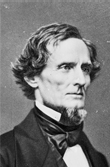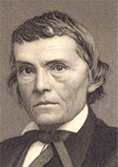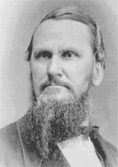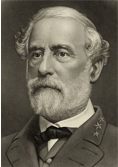Confederate Truths: Documents of the Confederate & Neo-Confederate Tradition from 1787 to the Present.








CONFEDERATE PROPAGANDA IN LONDON: An appeal to white supremacy
CONFEDERATE PROPAGANDA IN LONDON: An appeal to white supremacy
In order to win support for the Confederacy in Europe, the Confederate government decided to appeal to racism in Europe. The Index was supported with money from the Confederate government to gain support for the Confederacy. The Confederate and Neo-Confederate Reader has one article from this publication and here we include three more. An excellent biography on Herny Hotze is Henry Hotze: Confederate Propagandist, Selected Writings on Revolution, Recognition, and Race, Univ. of Alabama Press, Tuscaloosa, Alabama, 2008.
The Index, 10/23/1862, 413-14
Henry Hotze, Review of Distinction of the Races
"The Moral and Intellectual Diversity of Races, with particular reference to their respective influence in the Civil and Political History of Mankind. From the French of the Count de Gobineau. With an Analytic Introduction and copious Historical Notes, by H. Hotze." Appendix by J. C. Nott of Mobile. Philadelphia: J. P. Lippencott, 1850.
[Page 413]
The book "is founded upon M. de Gobineau's "Ineqalité des Races," and reproduces the leading ideas and arguments of that work in an English dress. But it contains a good deal that is not to be found in the pages of the French theorist...."
[Page 414]
It emphasizes heredity over environment. "The truth is, that so far from national character being molded by circumstances, the circumstances are governed, and in fact, created, by the character. England is a free country, because freedom is a necessity of natural existence to the race by which the national character of England has been determined." [Similarly,] "France oscillates between revolutionary chaos and personal despotism..." etc. "We might multiply without end the proofs of radical and ineffable distinctions between nations of the same stock. Every one of those named above is of that which is called the Aryan race, and speaks a language descended from the Sanscrit. But the great purpose of the book before us is to trace the wider differences which exist between different races; to indicate clearly the great gulf which separates the Caucasian from the Mongolian, and both from the African family of mankind; to show that these differences are not fortuitous or temporary, but fixed and congenital; that as the races differ in physical appearance, so they differ in moral and intellectual attributes; and that it is absurd and misleading to speak of them as if they belonged to one stock, or to reason as if that which is true of one race were necessarily true of the others." [Gobineau and Hotze] "waive all speculations as to origin and ... confine themselves to the facts of invariable and immemorial species difference. Whether Negro, Chinese, and Englishmen be all descendants of one primeval pair, they do not inquire, nor need we. It is enough that, so far as the records of human existence can be traced, the distinctions of race were what we find them now.... So long as the world of which we know has existed, the Negro has been a Negro, the Asiatic an Asiatic, the Caucasian a Caucasian; and we must conclude, ... that these distinctions will remain as long as the races continue to exist."
"We have used the term 'species' to designate the various races of mankind. If man be a species of the genus monkey, of course we have no right to do so, but if the human creation be a genus apart, then it would seem that Negro and European are as much distinct as are horse and ass, or hare and rabbit. There are only two rational objections ever urged against the doctrine of specific difference among mankind. The first is, that inasmuch as the various races were originally located in distinct regions, we may suppose their physical differences to be merely the effect of climate, operating through innumerable generations. The answer to this is that the supposition is wholly gratuitous. Races that have lived in the same climate for centuries remain as distinct as ever; neither sun nor soil can make the Caucasian resemble the Mongolian, or bring the Negro one whit nearer to the white man. Again, it is asserted that hybridity is a test of specific difference, and that human mixed races exhibit no signs of hybridity — that is, do not exhibit that infertility which is its assigned attribute. Of this objection we think that Dr. Nott's appendix conclusively disposes. He demonstrates clearly, first, that the permanent fertility of mixed races has not yet been established; and secondly, that among animals infertility is a matter of degree....
But admitting that even the most widely distinct of human races are only to be called varieties, it is impossible to deny that they are historically permanent varieties, and that their characteristics are, so far as we know or can judge, immutable and inexchangeable. The last refuge of those who dislike the idea of human inequality is to affirm that these characteristics are merely physical; that the Negro and the Chinese are equals in intellect and moral character; and that each of them is, or might by education be made, the equal of the European. To look at a specimen of each race is to feel that those who argue thus are arguing against conviction. It is impossible to believe in the intellect of the negro, or the moral vigor of the Mongolian. But if the question is to be discussed, it should first be asked how, if the Negro was qualified by nature to be the rival of the white man, it happens that he has always remained a savage, except where he has been made the white man's slave? It should be asked, if there be in the Mongolian or the Hindoo no inherent inferiority to the European, why within historic memory neither Mongolian nor Hindoo ever made any progress in civilization. Are we again to be met with the doctrine of circumstances — or, in other words, of chance? And again, how comes it that, whether slave in Africa or in the Confederate States, or freeman in Jamaica or in Massachusetts, the moral and physical peculiarities of the Negro remain unaltered? Everywhere he is sensual, indolent, and incapable of taking care of himself; everywhere he is an unwelcome guest, except where he is utilized by slavery. How comes it that the Chinese is everywhere a Chinese, unfit to be a slave, and disliked as a free immigrant, carrying everywhere the virtues and the vices which have made China what it is? But it is scarcely worth while to discuss an assertion so obviously untrue and so obviously absurd. Whenever and wherever we find each race, we find its moral and its intellectual characteristics as strongly marked, and as invariable as its physical peculiarities; and the same experience which proves the invariability of the one, establishes the permanence of the other.
It is absurd — it is dishonest — to select a few individuals from the inferior races, who have been distinguished by peculiar ability and exceptional force of character, and to present them as types of their race. Of course there are Red Indians who are cleverer than a stupid American; Chinese who are more virtuous and more energetic than a lazy and vicious Englishman; and even Negroes who are more capable than incapable Europeans; although in many cases it proves, on inquiry, that these selected specimens were men of mixed blood. It is a ridiculous to affirm that, because Toussault Louverture displayed capacity which would have done credit to an ordinary European, therefore Negroes might be made equal to Europeans, as it would be to assert that every clown$$ might, by education be made the rival of a Pitt, a Newton, or a Napoleon.
M. de Gobineau believed, on good historical evidence, that all civilization was initiated by a tribe of the Aryan stock; that even the exceptional culture of China and Hindostan are due to the presence of a white race which has since died out. And this is probable a priori, inasmuch as a race capable of bringing civilization to the point which it has reached in China and Hindostan, could hardly be incapable of further developing it. We have seen no parallel instance within historic memory; because we have seen no Aryan civilization imposed on an Asiatic race. But we have seen the same experiment tried on American tribes by the Jesuits; and it was found that, as soon as the white instructors were withdrawn, their docile pupils returned to their former savage state. The Asiatic races, of a somewhat higher quality than these, retained what they had received, but were incapable of adding to it. The negro resembles the tribes of Paraguay. One instance there is in which civilized negroes have been freed from the presence of the whites; and despite the influence of a considerable population of mixed race, Hayti has relapsed into African barbarism. A race which cannot keep the civilization it has received can only be saved from utter barbarism by continued contact and close juxtaposition with its civilizers.
And here we come to a point which is snot treated in this volume — the conditions under which such juxtaposition of races is possible or desirable. Can they live together as equals, when both feel that nature has made them unequal? The experiment has been tried — in the West Indies, and has utterly and disastrously failed. [cf. Jensen's parallel language re compensatory education] There remain, then, but three possible issues where, as in the Southern States, vast masses of two distinct and widely separate races are interfused — the extermination of the weaker, the amalgamation of both, or the subjection of the inferior. The removal of either race from the South is a matter of obvious impossibility; the destruction of either would be a crime from which the Enemy of Mankind might shrink with horror. Amalgamation must, we should think, revolt the feelings of every member of the superior race; it certainly is a consummation heartily to be deprecated by every man who knows what is the character of the mulatto blood. What remains, then, but that the Negro race should exist in a condition of permanent subjection, under the governance and tutelage, in some form or other, of the white race?
This problem is not directly touched in Mr. Hotze's book; but the whole argument prepares for it, leads up to it, and suggests a solution not the less clearly because it contains no immediate reference to the question.
From Vol. III, The Index, No. 1, May 1863, page 204, "The Natural History of Man," which is a review of a pseudo-scientific racist journal "Anthropological Review and Journal of the Anthropological Society of London,
"The most dangerous dogma of modern times, and that which, unconsciously to the majority of those who accept it, underlies nearly every social, political, and religious heresy which mars our civilization, is the dogma of the equality of man. Our daily experience belies it, our instinctive convictions repudiate it, our constant practice ignores it; and yet we continue to assert it, and in its various forms build upon it elaborate structures of theory....
"[S]ince the beginning of profane history no race of men is known to have changed its physical characteristics from any other cause than admixture; but that the moral land intellectual characteristics of all races are susceptible of development, the degree and nature of which are as yet a matter of doubt.....
If, then, science shall inform us that certain races of men are distinguishable by certain moral and intellectual, as well as physical attributes, it will only have done, in a wider field and with greater accuracy, what is habitually done in assigning to different nations of the same race certain peculiarities, terming one slow, another vivacious — one prone to abstract speculations, another to practical conclusions. It will have afforded no pretext for treating any race with injustice or contempt; but it will have enabled us to facilitate and further the progress of each in the career for which the Creator of all designed it...."
"We have been led into these reflections by the appearance of a new quarterly publication, the Anthropological Review.... [summarizes contents]
Vol. III, "The Negro's Place in Nature," page 522-3.
[Page 522]
"The very able, learned, and truly philosophic paper lately read by Dr. Hunt before the Anthropological Society, and which was published in the last two numbers of THE INDEX, cannot fail to command the critical attention of the scientific world, and the consequent discussion thereon will, it is to be hoped, do much toward solving the problem on which it treats. But it will be unfortunate if only those who are professed anthropologists should give heed to this valuable contribution to a hitherto greatly neglected, but highly important, subject.... The golden rule for the individual, for the nation, for all the peoples of the globe, is, that happiness and progress depend upon the right man being in the right place. Dr. Hunt justly deplores the misery that has arisen from ignorance and neglect of this law, and from this cause the negro has suffered more than any other race. Instead, then, of using the negro as a political shuttlecock, it is the bounden duty of all those who desire to promote his welfare to first find out his proper place in nature, and then to employ all legitimate means to see that he is where he should be....
[Page 523]
"The leading facts about the Negro are few in number, but they are sufficient to enable us to discern clearly his place in nature. The anatomist points out the differences between the conformation of the negro and the white races, and tells us that the brain of the negro is of smaller capacity. This class of evidence, though very important, is principally useful as an explanation of other phenomena. If anatomists had been silent we should still have known that the negro is inferior to the white man, though we should not have been aware of the immediate organic cause. If the negro race had been equal or nearly equal to other races, it would, like them, have had an independent history; but the negro has no history. When we trace his existence out of Africa in all ages we find him occupying a servile position, and at home his existence has been a blank. The negroes have never done anything in literature or science, not even to the extent of inventing a grammar. How is this? The negro has increased and multiplied as fast as other races and has had the same extraneous advantages. There is no other explanation than that the negro is undebatably inferior in intellect.
"The next fact which we have to look at is the condition of the race in Africa. It is utterly impossible to exaggerate the savage barbarity and the utter degradation of the negro at home...."
"What in modern times has been the condition of the negro abroad? In the West Indies the experiment has been tried of giving the negro full independence, and the result has been that a garden has become a wilderness, because the negro, except under compulsion, will not labour. In the Confederate States the negro race has been in subordination to the white race, and the result is, that it has made wonderful progress — that the savage has become a docile labourer, and that the heathen has become a Christian.
What, then, is the conclusion from these facts? Not, perhaps, that the negro should remain in perpetual slavery, but surely that the guidance and the intellect and the will of the white man are indispensable to him."
"Illustrations are however hardly necessary, because we have the negro in the Confederate States in subordination to the white race, and we can see how he fares under such circumstances. In Africa, as we have already observed, the negro is a savage and a heathen, and in a state of inconceivable degradation. In the West Indies he is idle and dissolute. In the Southern States he is, so every traveller avers, industrious, thriving and Christianised; there is not on the face of the earth a class of labourers so happy. All his wants are supplied, and he enjoys the comforts of religion. What more can the Christian or the philanthropist desire for him? Do we want the negro to continue as he is in Africa, a savage and a heathen? Do we want him to be as he is in the West Indies, a curse and an encumbrance? The philanthropist and the Christian must reply that it is better that he should be as he is in the Souther states, blest and a blessing. We may admit then, whether we are or are not emancipationists, fully and without hesitation, the conclusions that are suggested by Dr. Hunt's painstaking and clever essay. The negro's place in nature is in subordination to the white race; but let us be glad, that subordination, the result of intellectual inferiority, does not preclude happiness in this world, and thank God that no intellectual qualification is necessary for eternal Salvation."
* * * * *
"THE NATURAL HISTORY OF MAN"
The Index, 23 July 1863
The most dangerous dogma of modern times, and that which, unconsciously to the majority of those who accept it, underlies nearly every social, political, and religious heresy which mars our civilization, is the dogma of the equality of man. Our daily experience belies it, our instinctive convictions repudiate it, our constant practice ignores it; and yet we continue to assert it, and in its various forms build upon it elaborate structures of theory. The feeblest intellect recognizes a difference between self and fellowman, between one nation and another; a careless glance suffices to convince even the vulgar of the broad distinctions between the white man and the negro, or between them and the Chinaman or the Hindu. Yet by some strange perversion of ideas, the popular mind has come to associate the study of the human races with infidelity or, at least, skepticism. Every one admits the truth of the familiar line into which Pope condensed the advice of philosophers and sages. Under every aspect except one, man has been studied assiduously, and not unsuccessfully. As an individual, in his material relations to the material world, science knows him with an accuracy which leaves comparatively little that is attainable to desire. Even in that most difficult and dangerous path, the metaphysical study of man, there are not lacking brave and earnest laborers who are willing to hew the massive quarries of thought. But so soon as science attempts to consider man asa gregarious being, classed by the Creator into certain great and distinct groups, she is stopped at the threshold of the investigation by suspicions of the lawfulness of her proceedings. To a certain extent, the students of the science of races have doubtless themselves to blame for this prejudice against them. They have, in many instances, unnecessarily brought themselves into at least apparent contradiction to Holy Writ by inquiries into the origin of man." We say unnecessarily, because even if it were permitted for human shortsightedness to fathom the mysteries of the creation, it could have no personal bearing on the legitimate subjects of inquiry, whether all mankind was descended from a single pair, or whether there had been—to borrow from Mr. Agassiz's phrase—several distinct centers of creation. Whether the Great Architect primarily ordained the existing differences between distinct varieties of man, or whether He subsequently effected the same object by such means as he saw proper, science has to deal only with the facts as she finds them, and her duty is confined to the solution of two problems—first, what are these differences, physical, moral, and intellectual; and secondly, are there any ascertainable means by which they can be modified or removed? If science does not transgress these bounds, it is difficult to see how she can step upon forbidden or even dangerous ground.
The second of these questions must always remain an open one, since science is compelled to prove a negative. All that can be said with any degree of absolute certainty is, that since the beginning of profane history no race of men is known to have changed its physical characteristics from any other cause than admixture; but that the moral and intellectual characteristics of all races are susceptible of development, the degree and nature of which are yet a matter of doubt. The first question, that is, what the differences actually are, is, although not easy, certainly less difficult, because the answer depends on positive facts which research is daily increasing in number. There are those who profess apprehensions in the interests of religion, as to what the answer may be. Let them not be disquieted. The plan of salvation, as it comprises all colors, comprises also all grades of intellect. As we do not measure a man's claims to Divine mercy by the weight or texture of his brains, so neither need we those of races; and there is no reason why we may not admit the same relative difference to exist among races that we know and feel to exist among men of the same race. To say that this or that race is distinguished by some peculiar aptitude or inaptitude cannot be more unjust or improper than to say that one man is superior in some respects while another is deficient. The shortest road to infidelity in morals, politics, and religion, is taken by him who sets out with the idea that all men are born equal in all respects, and that the apparent differences of later life are the results of external circumstances and accident."
If then, science shall inform us that certain races of men are distinguish-able by certain moral and intellectual, as well as physical attributes, it will only have done, in a wider field and with greater accuracy, what is habitually done in assigning to different nations of the same race certain peculiarities, terming one slow, another vivacious—one prone to abstract speculations, another to practical conclusions. It will have afforded no pretext for treating any race with injustice or contempt; but it will have enabled us to facilitate and further the progress of each in the career for which the Creator of all de-signed it. It will have shed a light over much that is now dark and mysterious in the history of the past, and in the history we ourselves are writing by our acts in our day. Fanaticism is always the child of ignorance or imperfect knowledge; or it is, at best, the contortion of a part of the truth from its true proportion to the whole truth. Individual man is but an insignificant atom in the society of which he forms a part; it was appointed that his onward march should not be singly, but in troops; and the more we know of the natural relations of the different societies, each of which has its appointed task, the more benevolent, because the more enlightened our judgment will become.